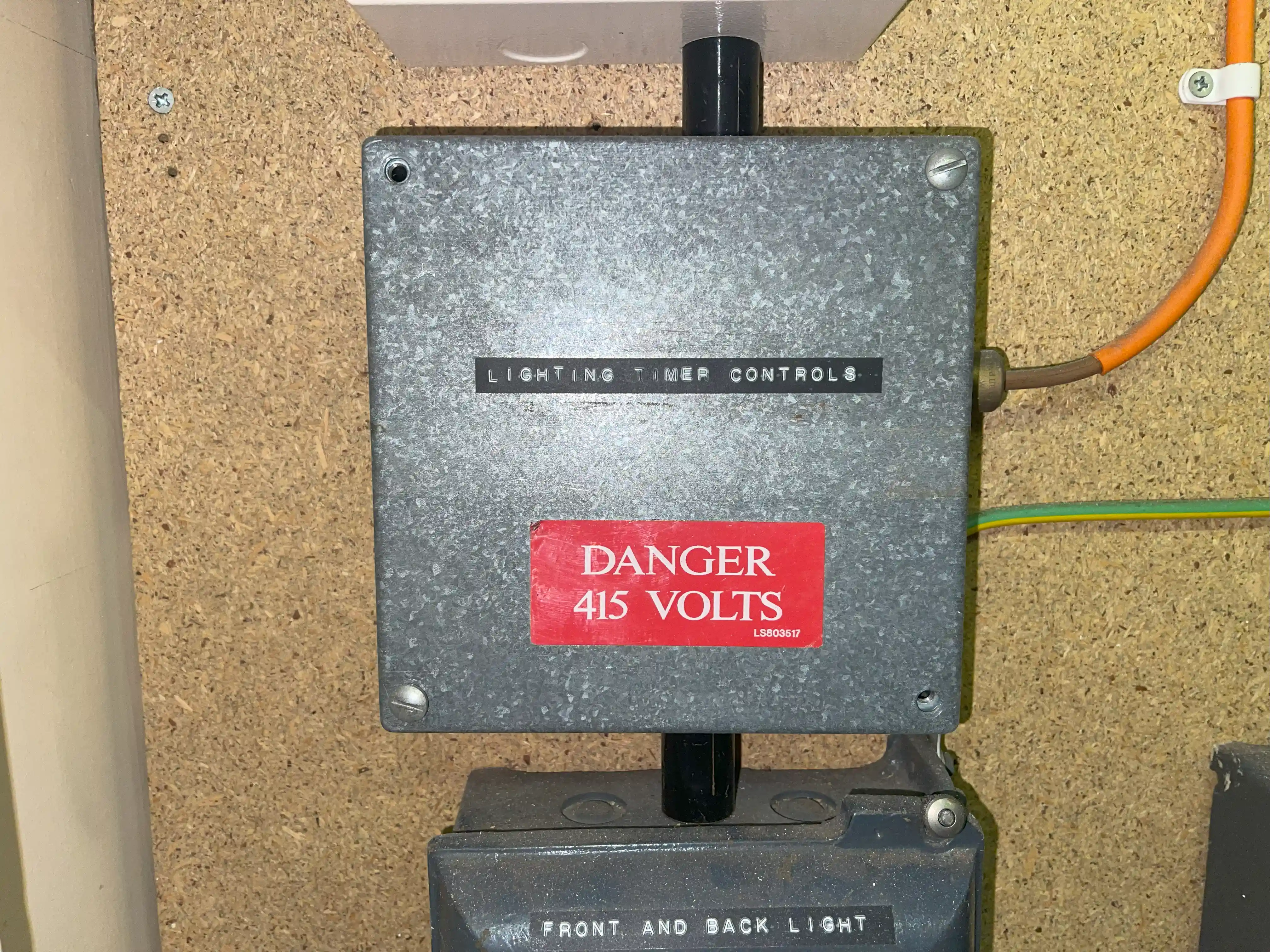Open 24 hours a day, 7 days a week, 365 days a year. We reach you within 30 minutes of your initial contact with our team. Our expert commercial and domestic engineers are fully qualified by City & Guilds to solve emergency problems.
Call Now 02034881842
£30 call-out fee
Competitive Call out fee

Quick response
We can dispatch Our engineer fast to your property within time of 30-90 minutes of your call, and we are available 24/7 365 days.

Payment upon completion of work
We never request payment upfront. With our service, you only pay when you're completely satisfied.

Certified
Our electricians come highly recommended by numerous satisfied customers. Additionally, we hold certifications from esteemed industry trade bodies.
Reach out to us
Choose a suitable appointment
Our engineer is on the way to resolve the issue

We are offering 24-hour a day chat support on the web. Please click the button below to chat with one of our representatives.
Click to Chat With Us
We are offering a 10% discount for the volunteers and workers of the following organizations:
Power Cut
Panel Repair
Fuse Box is Tripping
Power Restoration
Socket and Switch Relocation or Repair
Burglar alarm
Carbon monoxide alarms
Fire alarm
Door entry system
Electric boiler
Underfloor heating
Night storage heaters
Radiator
Heating
Air conditioning
Hot water boiler
Power shower
Storage heater and hot water immersion heater
Hot water cylinder
Immersion heater
Smart thermostats
Hot tub wiring services
Automated gates
Electric shower
Rewiring
3-phase electrics
Car charger
Consumer unit replacement
Fuse box upgrade
In case of electrical problems, call an emergency electrician for fast response to your emergency call, ensuring safety regulations and NICEIC approved quality for a range of electrical services including electrical installations, fault finding, and handling electrical faults such as power outages, electrical fires, or issues with heating electrics; our emergency services cover both domestic and commercial properties, with our emergency plumber ready to assist and guarantee customer satisfaction in home services—company number provided for all your electrical system needs. In the event of an electrical emergency, our emergency electricians are ready to handle all electrical emergencies, whether it's a power outage, electrical fire, or issues with your fuse box or consumer unit. We offer competitive rates for all electrical work, ensuring excellent electrical safety and installation condition for both domestic electrical and commercial electrical needs. As an approved contractor, we pride ourselves on top-tier customer service and reliability.
We provide and handle emergency electrician services as company Grip Electric Limited in St Albans.
In electrical emergencies, our professional emergency electricians provide top-notch emergency electrical services. Whether it's an electrical emergency with a consumer unit, electrical work, or other electrical issues, our emergency services are designed to handle all types of electrical emergencies efficiently.
£63 per 15 minutes**
Signs that you need to call the electricity supplier rather than an Grip Electric Limited
If
1. All of your switches are up and not tripped in the Fusebox or consumer unit.
2. Check your meter as well that it's topped up,
3. Then, you will need to call an electricity supplier rather than an emergency electrician. Here is a comprehensive list of electricity suppliers and their contact details that we have prepared for you
British Gas, E.ON, EDF Energy, npower, Scottish Power, SSE, SSE Southern Electric, Bulb
Please dial 105 for nationwide electricity supplies UK power network and press 2 for power cuts. If they suggest that you need an emergency electrician, then give us a call or chat with the support team. An emergency electrician will be arranged within 30 minutes. If you are in an area that is not covered, search online for an emergency electrician near me, and you will be able to find someone very close to you.

Need an hour emergency electrician? Our hour emergency electrician team handles emergency calls and emergency callouts day or night. If you face an urgent electrical issue or electrical problem, you may need an electrician immediately. We prioritize a swift response time, often aiming for an hour response. Wondering how quickly an emergency electrician arrive? We strive to arrive at your property promptly, often able to reach a property within an hour. It's crucial to find an emergency provider you trust; find an emergency electrician offering a reliable service. Don't hesitate to call an electrician for any electrician emergency. We are local emergency electricians providing a dedicated emergency electrician service. Count on a reliable emergency response from a reliable emergency electrician. Whether you need an electrician Liverpool or specifically an emergency electrician Liverpool, our principles of fast service apply. We operate as an emergency call out electrician service. Our hour emergency electricians are ready. Contact an emergency specialist; contact an emergency electrician now for emergency repair or emergency repairs. Make that electrician call if you need an electrician urgently. Use our emergency electrician call line. We are your hour electrician with a target hour response time. How quickly can an emergency electrician respond? We aim for speed. You can book an emergency slot or book an emergency electrician online. Available hours emergency.
Are you experiencing an electrical fault? Noticing burning smells, sparks coming from outlets, or sparks flying? These often indicate a serious electrical issue. Common problems include tripping circuits. Don't ignore exposed wires, a faulty circuit, or components sparking overheating. General wiring issues, visible electrical sparks, or suspected faulty installations require attention, as does outdated wiring. Have you seen brown stains or burnt outlets (stains on your sockets)? Smells coming from your cables or signs of damaged power lines are significant fire hazard warnings (fire hazards) that can lead to overheating and fire. A sudden power cut affecting your power supply also needs investigation. We perform electrical fault finding (fault finding electrical, finding electrical, finding electrical repairs) to diagnose the problem issue quickly.
We offer a wide range of electrical repairs (repairs electrical) and install emergency lighting. Our work includes consumer units, appliance testing including portable appliance checks (portable appliance testing or PAT testing), and sourcing replacement parts or spare parts. Our services domestic and services commercial cover your home or business. Services emergency response is key, but we also undertake planned work, electrical installation work, and general electrical works, including electrical rewiring and fitting new wiring. Need cooker installation (specifically electric cooker installation)? We handle that, plus light fitting, lighting testing, lighting sockets work, extractor fan installation, and security lighting. We install fire alarm systems and smoke alarms, conduct safety checks (safety check) / safety inspections, and provide safety certificates. Our electrical testing ensures compliance. Ask about storage heater repair, fuse box testing and replacement (box testing, box testing and replacement), or inspecting fuse boxes. We handle diverse electrical jobs, including installations rewiring and underfloor heating. Our maintenance services cover electrical inspections. While focused on electrical tasks, we can liaise on plumbing and electrical projects, including services plumbing, heating repairs, central heating, gas boiler issues, new boiler needs, water heater / storage heater problems (heater repair), air conditioning, water leak detection (leak detection), blocked drains, gas fire servicing, heating system checks, or a plumbing issue. We sometimes assist with odd jobs, carpentry doors, painting and decorating, and coordinating with services roofing for comprehensive property maintenance, perhaps for a rental property or your new home. We even consider factors like pest control if it impacts wiring.
Gain peace of mind by choosing a qualified electrician. Our team comprises qualified electricians (approved electricians, certified electrician, certified electricians, certified emergency electricians) who are City and Guilds qualified (Guilds qualified, city and guilds). Many clients highly recommend us, often citing excellent service and great service. We strive to do a great job. Expect a reliable service that is also an efficient service from trusted electricians. We deliver high quality work, and our team is known for being polite professional and friendly professional. With years experience, we ensure good communication (great communication) and good service, maintaining a professional service ethic. We provide a fast reliable (fast reliable service) response, aiming for great customer satisfaction and meeting high standard requirements (high standards) on all work. As local electricians (local emergency electrician), we are fully equipped and highly experienced. While people may hesitate to recommend or express hesitation in recommending services generally, our reviews highlight our rapid response and how extremely professional we are. We aim to be the find the best option when you need to find reliable help. Our work is often guaranteed for 12 months. We use vetted tradespeople and are dedicated to providing quality work. Team members arrived promptly / arrived on time and are considered efficient and reasonably priced. Our response team ensures a quick efficient, stress free experience. Many recommend their service. Expect a high level of service as we respond quickly and are consistently professional and efficient. We offer great customer service. It was a pleasure to deal with our team; the work was carried out effectively and the job was completed / work completed properly, getting the issue sorted quickly.
All our installation work complies with the British Standard, specifically Standard BS 7671 requirements for electrical installations (requirements for electrical, requirements for electrical installations). We strictly adhere to building regulations. Ask about our guarantee accreditations. It’s important that your property is safe; we inspect the problem thoroughly, restore power safely, and ensure everything meets requirements before we leave your home. Our goal is to protect your property and help you stay safe.
Have asked questions? See our frequently asked questions (frequently asked questions, time frequently asked, time frequently asked questions). You can easily book online or online book. Read our customer reviews (reviews contact). Our standard opening hours are 24 hours although emergency electrician emergency electrician services operate outside these times, even on a public holiday. We offer competitive pricing and transparent pricing with no hidden costs or hidden fees. We are upfront about any call out fees or call out charges. For planned work or emergencies affecting domestic commercial properties, contact us our team. Use the contact form, contact us call directly, or request a callback. Contact us today! Get estimated costs and arrival time information. Find contact emergency details readily if you need to find an emergency electrician. You might find us on Facebook Twitter. To improve our website and your user experience (improve your experience / best experience), we may collect information like number of visitors anonymously using cookies which might be stored in your browser (you can usually save accept preferences based on company policies). See our contact us sitemap for navigation. The booking process is simple. This overview this website details the services we provide. Check availability with a member of our team.
When facing urgent electrical issues, finding the best emergency electrician is crucial. We offer emergency assistance through dedicated emergency call outs as well as standard call outs. Our electricians are on hand, providing fast support when you need it most. Choose us for emergency situations; we strive to resolve your electrical issues immediately, working swiftly and efficiently. We handle repairs emergency needs, ensuring problems are diagnosed and fixed, often providing a same-day response or day service even on short notice. Our goal is always to resolve electrical faults promptly, including issues related to emergency heating.
As professional electrical contractors, we provide a wide range of services covering both domestic and commercial electrical requirements. This includes all aspects of home electrical work, functioning as a domestic installer for various systems like car chargers. Our expertise encompasses electrical repair, thorough fault finding electrical repairs, fixing electrical outlets, and critical repairs fuse or repairs fuse box tasks. We also offer complete rewiring services and appliance installation. Whatever type of electrical service you need, our team offers skilled solutions.
It's important to find a reliable electrician, and our local heroes are here to help. You can easily find your local expert through our service and book an electrician online or by phone. We pride ourselves on being polite and helpful as well as friendly and efficient. Before starting work, we conduct a risk assessment for safety. You can view examples where we have completed a project and learn about our experience on our website. Details about our services areas we cover and hourly rate are available, though all services are subject to availability.
We’re proud to serve multiple locations across the United Kingdom. Our experts visit homes and businesses in Surrey, Sussex, Kent, Essex, Berkshire, Buckinghamshire, Hampshire, Oxfordshire, Hertfordshire, Bedfordshire, Cambridgeshire, Gloucestershire, Wiltshire, Somerset, Dorset, and Devon. We also provide coverage in Greater London boroughs including Islington, Kensington, Richmond, Croydon, Kingston, Camden, Hackney, Enfield, Fulham, Hammersmith, Lewisham, Wimbledon, Chelsea, Ealing, Bromley, and Greenwich, often nearby the M25 and Thames. Further afield, our reach extends to cities like Brighton, Hove, Portsmouth, Salisbury, Canterbury, Chelmsford, Peterborough, Ely, Exeter, Gloucester, Oxford, Plymouth, Stoke, Bristol, Derby, and up to Yorkshire, Durham, Worcester, Norfolk, Suffolk, and even parts of Scotland like Glasgow and Wales. We visit areas such as Guildford, Romford, Twickenham, and Walton on Thames. Sea views aren't our usual site, but we travel widely.
Our competent professionals and trades people offer a full range of services. We fix, replace, and install everything from a leaking tap or shower in the bathroom to a full kitchen refurbishment, including tiling and plastering. We handle electrical work, like eicr tests, socket and outlet installation or replacing a consumer unit (board), led lighting, and rewire projects, essential to prevent shocks or overloaded circuits which pose a danger. Our services include plumbers for drainage blockages (blockage) and leaks, heating engineers for boilers (bolier) and radiators (radiator), roof repair to stop leaks and damp, guttering cleaning, window and door fitting or replacements, locksmith services, and even gardening and landscaping. We manage minor issues and major projects, ensuring workmanship is outstanding. We also offer removal services for waste disposal. If part of your house needs attention, we're here to help. Our handyman service can tackle small jobs too. We carry the necessary equipment and devices.
It's easy to start working with us. Visit our site or contact our office via email, message, phone, or Whatsapp to request a quote or arrange an inspection. We aim to respond asap, often scheduling appointments for Monday to Friday between 8am and 5pm, and sometimes weekends by arrangement. We can schedule visits for Saturday or Sunday in some cases. We'll explain the situation, what's needed, the scope of work, and the likely cost or price for the part or labour. Our price structure is clear. Our technician will visit your location at the agreed date and timeframe. We carry common equipment and parts to rectify issues quicker. You can track bookings via your account on our page or pages on our websites. We value feedback and encourage you to leave a review on Trustpilot. Check our blog and news content for tips and updates. We comply with GDPR; your consent matters for data collection and marketing. Subscribe to our newsletter for the latest deals.
We specialise in identifying the root cause of damage, whether it's damp, mould on walls or the ceiling, leaking pipes causing flooding or flood damage, drainage blockages, loose fittings, or electrical faults. Recognising warning signs like a loose wire, flickering lights, trips of the rcd, or an overloading socket is essential to prevent danger, shocks, or even fire (burn). An eicr report is required for landlords and recommended for all homes to identify potential risks. Overloaded circuits (overload) are a major, hazardous issue. We use troubleshooting techniques and equipment to assess the severity and provide the correct, effective solution. We can rectify poor workmanship from a previous party and ensure all work is performed safely, professionally, and in accordance with regulations. Don't wait if you suspect a problem or failure; calling us is the best action to take to avoid future complications or incidents. We aim to reduce stressful situations.
We're proud of our reputation for delivering outstanding, superb workmanship and fantastic customer care. Our team (Andrew, Ben, Caroline, Daniel, James, Jamie, Jay, John, Lee, Mike, Sam, Sarah, Steve, Sue) are trained, competent, registered, and knowledgeable professionals. Customers often leave positive feedback and ratings, mentioning our prompt, punctual, responsive, and tidy approach. We've heard feedback calling our service "amazing", "absolutely superb", and "nice". We appreciate comments about our pleasant, cheerful, kind, and considerate manner. We aim to be honest, dependable, trustworthy, and helpful. We understand that dealing with property issues can be stressful or hassle, so we strive to make the process fuss-free, offering a reasonable price (cost) and clear communication from the start. Your satisfaction is our priority. We appreciate your trust and confidence and aim to meet your expectations. Here's to happy customers!
Beyond regular maintenance, we handle occasional repairs and full refurbishment projects including loft conversions and extensions. We consider design aspects for kitchens and bathrooms. We manage everything, keeping the site clean. For landlords, we offer special rates and annual checks (e.g., eicr, boilers). We understand the urgency when heat or hot water fails. Our minimum charge often covers the 1st hour (hour). Travel time might be an extra charge, depending on location and congestion. We advise on energy-efficient options like led lighting, smart devices, or even solar. We can also help with minor tasks. Remember to regularly check smoke alarms. Don't worry; we'll sort the matter. We've got plenty of options. They'll confirm we're the right choice. This isn't hard for us; it's what we do. We use media like YouTube and Instagram – follow our links. You'll receive great service. We're making a difference in property care.
Terms and conditions
15 minutes service charge applies first hour and all prices are excluding VAT materials